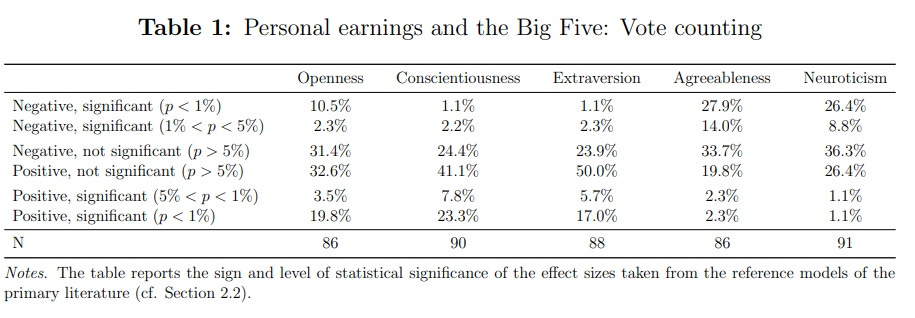Why Aren’t Extraverts Rich?
Personal connections are crucial for job search. As I often repeat, “Friendship rules the world.” Yet most empirical studies fail to find any connection between extraversion and career success. This recent literature review reports that over 75% of empirical studies fail to find that extraversion significantly raises earnings. What’s going on?
Critical fact: Measured personality in general has a weak connection to career success. Here’s the summary table from the aforementioned literature review of the connection between earnings and Big Five personality traits:
Check it: The median result for all five traits is non-significant. Even so, the evidence clearly leans in two directions.
First, there is roughly a three-way tie for Openness, Conscientiousness, and Extraversion as positives.
Second, there is roughly a two-way tie for Agreeableness and Neuroticism as negatives.
The straightforward view, naturally, is that while personality predicts many life outcomes, it simply isn’t very important for money-making.
Hard to believe, but still worth pondering. How could extraversion not make you rich?
The simplest story is that extraversion has negative as well as positive career effects. Yes, extraverts make more work connections. But they also make a lot more non-work connections that distract them from getting ahead. Extraverts spend/fritter more time socializing, partying, and dating. And contrary to Granovetter’s “strength of weak ties” story, non-work connections almost never turn out to be professionally useful. Career-wise, they’re a fun dead-end.
This story does have a testable implication, though as far as I know, no one has tested it. Since Conscientiousness picks up “orientation toward work versus play,” one prediction is that it will shift your distribution of “work friends” versus “non-work friends.” Which in turn predicts that the largest social networking benefits will go to conscientious extraverts.
A subtler story reminds us that some of the most effective career connections are close family members. Since such connections are, in an important sense, “unchosen,” they’re about as useful for introverts as they are for extraverts. In fact, one could even imagine that family pro-actively helps introverts. If you’re too shy to make business connections on your own, maybe your mom calls her sister to pressure her husband to give you a job.
This story, too, has the testable implication that introverts will receive more career help from relatives.
The main alternative to all of these stories, admittedly, is that personality tests aren’t great ways to measure true personality. Most obviously, Social Desirability Bias distorts a great many responses. All personality tests I know of are top-coded at “Strongly Agree.” So when faced with statements like, “I like people,” lots of introverts give the maximally extraverted answer. As a result, they get coded as extraverts, leading researchers to greatly understate the true power of personality.
What’s the correct mix of stories? If you know (or find out) your measured personality, what best fits your labor market experience? Introverted insight especially welcome!



I am introverted and I strongly believe I am being underpaid relative to my more extroverted peers. I work at Amazon as a Software Development Engineer. There, they give titles like SDE1, SDE2, SDE3, etc., where a higher number implies higher skill level and thus higher pay. I am currently an SDE2.
Almost everyone who interacts with me says I should be SDE3. Managers and peer describe me as the highest performing member on my team. And yet, other people get promoted to SDE3 and I remain an SDE2.
One of the main cause for this discrepancy is that to get promoted, you need to be boastful and constantly selling yourself to people you would otherwise not interact with. Specifically, it's not your manager's decision whether or not you get promoted. All managers try to get their SDE2s promoted to SDE3, but all these requests get presented to a committee of higher-ups. And having good relations with these higher-ups (even though there's no business justification for why you would ever interact with them), and especially having them recognize your name in a pile of applications, greatly enhances the odds that you will be promoted.
There's apparently a scarcity mindset for these promotions, where the higherups don't want to promoted too many people to SDE3. So while I do great work, and my manager can tell them that I do great work, every manager says their SDE2s do great work too. And the extroverted ones, the ones that the higher-ups have heard of and interacted with and get a general impression of confidence and high energy, are the ones that get promoted.
Do studies of personality and earnings generally control for IQ and sex? Depending on the answer, it would change the plausible theories alot.